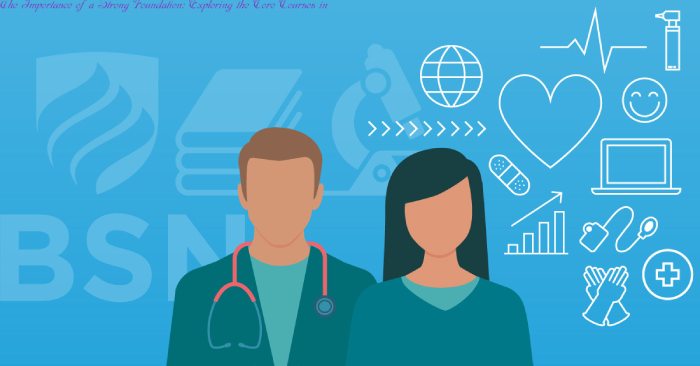The Importance of a Strong Foundation: Exploring the Core Courses in Your BSN Curriculum

The Importance of a Strong Foundation: Exploring the Core Courses in Your BSN Curriculum
Like a building’s foundation, the core courses of your nursing degree support the entire structure. They also teach you essential skills.
Advanced pathophysiology builds on your previous physiology course and explores more complex body functions. It also teaches nurses to conduct health assessments.
Leadership management, typically offered later in the program, is designed to help students develop their professional nursing identity and learn how to become leaders in patient care.
Table of Contents
Anatomy and Physiology
Anatomy describes the appearance or visual aspect of various body structures. It includes gross anatomy, which studies macroscopic structures, and histology, which studies microscopic cells and tissues.
Physiology explains how those body structures function. For instance, the length and shape of a hand’s fingers (form) determine what they can grab (function). This is usually one of the first required classes.
Pathophysiology
Infections manifest differently in different patients. This means what may be expected for one person can cause a severe condition in another. Mastering pathophysiology helps nurses recognize and treat illnesses properly.
Microbiology
Nurses use the concepts they learn in microbiology courses when analyzing smears for contamination. They also apply the information to ensure environmental controls are in place to prevent contamination and infection.
Nutrition
Nutrition is the study of food and how it affects humans. This course helps students understand how to provide patients with appropriate nourishment.
BSN curriculum and courses are typically four-year programs. RNs who
earn a BSN graduate with more advanced nursing skills, which is why many healthcare facilities prefer to hire nurses who hold a BSN degree. The higher level of training is also more fulfilling and exciting for nurses.
Pharmacology
The study of medications and their interactions with biological systems is known as pharmacology. It involves pharmacodynamics and pharmacokinetics, which focus on the effects of chemicals on cellular receptors.
RNs must know how medications work to help patients take their pills correctly. Pharmacology courses also explore how medications affect physical and mental health. This includes the effects of addiction. The study of drugs dates back to medieval apothecaries, who recorded herbal remedies in books.
Psychology
Buildings can only be built up with a proper foundation. If the foundation is weak, it can’t bear the tons of weight.
Students may take courses outside the Psychology Department for advanced elective credit with departmental permission. These outside courses must have significant empirical psychology content.
Sociology
Students explore the core theoretical perspectives and scientific methods that distinguish sociology from other social sciences. They learn that a sociologist’s research can involve administering questionnaires, conducting interviews or participant observation, or analyzing archival
data.
Students also study different elements of culture, such as mental models, modes of categorization, values, and speech forms. They learn that cultural phenomena can be found at various levels of socialization, from the personal to the global.
Leadership
Just like a house, every successful building requires a strong foundation. Leaders with a solid foundation have clear values and principles that help them navigate challenges and stay motivated.
Strong leaders create positive work cultures by being transparent and
communicating honestly and openly with their teams. They also support their team members by giving them the resources and tools they need to perform well.
Ethics
A significant portion of nursing practice involves making decisions in ethically challenging situations. However, limited consensus exists at the undergraduate level on ethics content and teaching methods.
A normative approach is one method that is often used to teach nursing students how to make reasoned arguments for their positions on moral issues related to nursing and healthcare. This prepares them to participate in ethical discussions with other healthcare professionals.
Community and Environmental Nursing
Like a building, a BSN program is only as strong as its foundation. The foundation must serve several functions, including providing a solid surface for other parts of the building to be constructed on top of.
Health assessment is one of the more critical nursing courses aspiring RNs must complete to earn a BSN. It covers the basics of how to assess a patient’s vital signs.
Also read:-Five Ways to Reduce the Cost of Medical Services and Procedures




